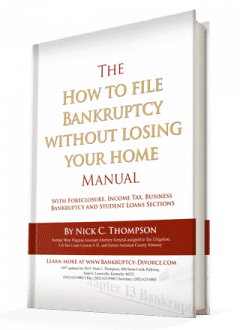Kentucky, Indiana, and most bankruptcy courts have a simple Chapter 13 confirmation procedure. Many courts require the debtor to sign and review the list of the debtor duties in Chapter 13. Chapter 13 is basically a contract that discharges at the end of the case if the debtor performs his part. In Indiana and Eastern Kentucky, these duties are outlined in the Rights and Responsibilities document filed with the court.
The primary debtor duties are to make payments on time to the plan and/or to the mortgage. These payments start the month of the case filing. However, if the debtors fail to make payments the trustee will file a motion to dismiss the case or the mortgage company will file a motion to terminate the stay so a foreclosure can proceed.
Debtor Duties in Chapter 13 Bankruptcy for Louisville Kentucky
In Louisville Kentucky, the debtor duties include several major mandatory actions. After the plan is confirmed, the court issues an order confirming the plan with the following requirements to the debtor:
1. Obtain permission from the court to purchase property or finance debt during the plan.
Debtor’s duties might include considering whether he needs to purchase an auto before he files Chapter 13. Some Judges may decline purchases for more expensive autos or higher interest rates after the case is filed. These judges mean well but might unintentionally leave you with no car to get to work. Additionally, motions must be filed to approve these purchases and applications often take 20-30 days to be approved.
2. Provide an annual copy of your tax return.
In Louisville, debtor duties include providing an annual copy of their tax return. In Western Kentucky, this also includes turning over the tax refund to the court unless the plan pays 100% to the unsecured creditors. The penalty for the failure to turn over the tax refund or to provide copies of the tax return and budget is simple: dismissal of the case.
3. Provide an annual budget to the court.
Debtor duties also include providing an annual budget to the court. This normally only means that the debtor copies their Schedule I and J unless substantial changes have occurred.
4. A request for discharge must be filed at the end of the case.
At the end of the case, debtor duties include filing a single-page request for discharge in order to obtain the discharge. Primarily this simply states the debtor’s address and employer at the time of the discharge. Its purpose is to advise child support and alimony recipients of the debtor’s address and employment. You have to file it regardless of whether you owe child support or alimony.
5. Take the required training for a Debtor Education Certificate.
Debtor duties include completing the second required training which is the Debtor Education Certification. This is a requirement for discharge. Failure to file this before the case ends might result in your case getting closed without a discharge. When that happens, you end up paying a filing fee and attorney fee for two motions. The first motion allows you to reopen the case while the second allows you to file the certificate late and enters the discharge.
6. Make your payments on time.
Make the payments on time to your mortgage and to the Trustee. These payments start the day you file.
7. Remember to review your claims.
An additional debtor duty includes reviewing the claims after confirmation. The creditor must file claims to be paid. These claims receive approval unless there is an objection from the debtor, attorney, or trustee. This is important because claims sometimes get filed in the wrong case or maybe for the wrong amount. Additionally, sometimes claims are filed although you bankrupted the debt in a prior case or paid it. For that reason, you must review the claims about 30-60 days after the confirmation hearing to ensure you don’t overpay your Chapter 13 or pay a debt that does not even belong to you.
The failure to follow these steps will result in dismissal of the case or in an overpayment to the creditors. Often the debtor will forget and make the mistake of selling assets while they are in Chapter 13. If these assets are sold by a Chapter 7 trustee the debtor will have problems if they attempt to convert.
For a more complete explanation of your duties see the Western Kentucky Chapter 13 Bankruptcy Rules.
 Resources for Bankruptcy
Resources for Bankruptcy
Louisville Kentucky Bankruptcy Forms
Annual Budgets and Tax Refunds in Bankruptcy • Video
Kentucky SBRA Chapter 11 Bankruptcy Case
Kentucky SBRA Small Business Bankruptcy Checklist • Video
If you are thinking about filing bankruptcy, don’t delay because timing is crucial. I am here to help you. So, contact my office right away to start the conversation. Nick C. Thompson, Bankruptcy Lawyer: 502-625-0905.

